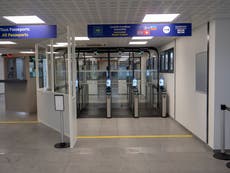Brexit: Warnings of food price hikes and shortages after no-deal are ‘bumps along the road’, Raab says
'There will be some bumps along the road if we don't get the free trade deal – that's the inevitable consequence of change’
Your support helps us to tell the story
From reproductive rights to climate change to Big Tech, The Independent is on the ground when the story is developing. Whether it's investigating the financials of Elon Musk's pro-Trump PAC or producing our latest documentary, 'The A Word', which shines a light on the American women fighting for reproductive rights, we know how important it is to parse out the facts from the messaging.
At such a critical moment in US history, we need reporters on the ground. Your donation allows us to keep sending journalists to speak to both sides of the story.
The Independent is trusted by Americans across the entire political spectrum. And unlike many other quality news outlets, we choose not to lock Americans out of our reporting and analysis with paywalls. We believe quality journalism should be available to everyone, paid for by those who can afford it.
Your support makes all the difference.Dominic Raab has dismissed supermarket warnings of food price hikes and potential shortages if there is a no-deal Brexit as “bumps along the road”.
Tesco has predicted average rises of 5 per cent – with much bigger increases feared on some meats – and is stockpiling non-fresh food, to prepare for disruptions to supplies.
But Mr Raab said he was “not concerned” about the impact on shoppers, arguing higher tariffs were “a very minor proportion of what goes into food prices” and 50 per cent of supplies were domestic.
Any price hikes would be “very much at the margin” and other future free trade deals would create “opportunities in other areas to reduce food prices over the medium term”, the Foreign Secretary argued.
“We've got quite diverse food supply food supply chains,” Mr Raab told BBC Breakfast, adding: “I'm not concerned about either the supermarket cupboards running bare, or the cost of food prices.
“Equally, there will be some bumps along the road if we don't get the free trade deal – that's the inevitable consequence of change – but we'll be well braced and well prepared to deal with those.”
On Tesco’s warning of 5 per cent price hikes, he said: “I don't think that's the figure that we recognise” – but failed to provide a different one.
Mr Raab also hinted the trade talks with the EU could continue past Sunday, despite Boris Johnson and Ursula von der Leyen, setting the latest deadline after their Wednesday night summit.
Carrying on into next week – with deadline of 31 December for crashing out of the transition period then little more than two weeks away – was “unlikely, but I can't rule anything out”.
Later, in a separate interview, the Foreign Secretary called Sunday “a moment of finality”, but denied it was a firm cut-off date – adding one could “never say never”.
He also revealed he had not spoken to the prime minister since he returned from the Brussels dinner, despite being his deputy and being sent out for morning interviews.
The talks remained mired in deep disagreements over fair competition rules, fishing rights and how to police any deal, despite months of negotiations.
Ms von der Leyen said the two sides were still “far apart”, while Downing Street said “very large gaps remain”.
Talks between the UK's chief negotiator David Frost and the Michel Barnier, his EU equivalent, will resume in Brussels on Thursday, but with little apparent hope of progress.
In no-compromise comments, Mr Raab vowed the UK would not “sacrifice” its ability to control fishing waters and laws on standards to achieve a trade deal with the EU.
“No other country would accept that and nor would the EU in terms of its dealings with third countries,” he said – insisting the UK had shown “pragmatism” during the negotiations.
“On the fisheries, we've accepted that there needs to be some sort of transitional period but we must be able to control access to our own waters,” Mr Raab said.
Insisting the UK was “not going to be treated...in a way that no other country would accept,” he added: “It's about some basic respect for democratic principles.”






Join our commenting forum
Join thought-provoking conversations, follow other Independent readers and see their replies
Comments